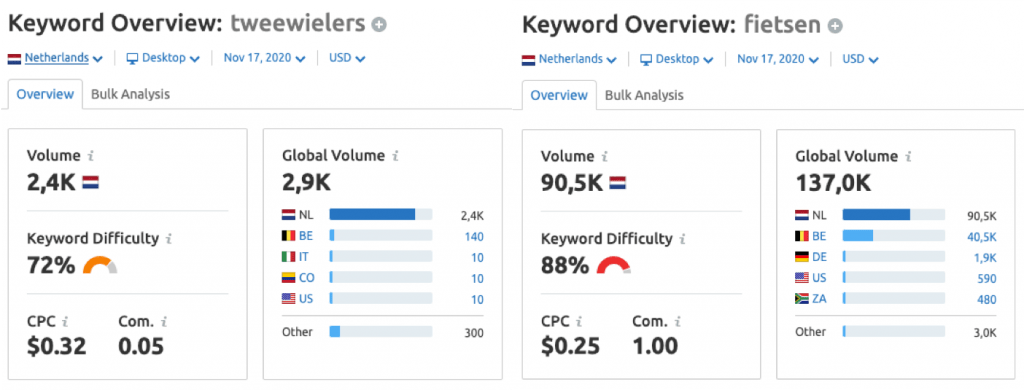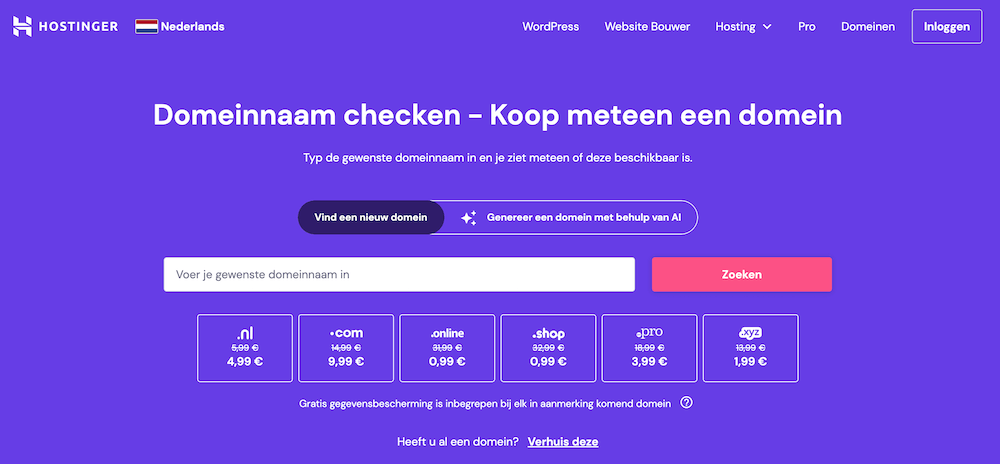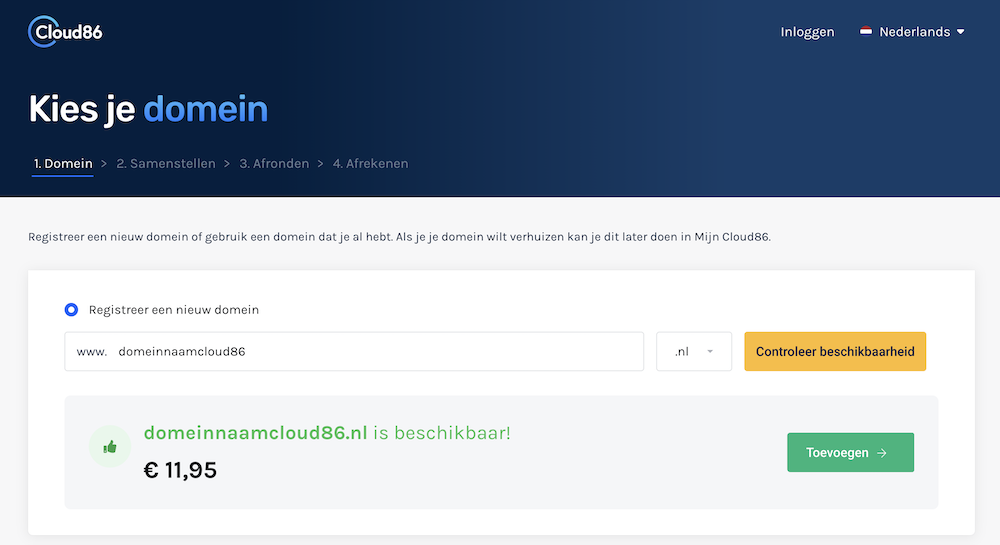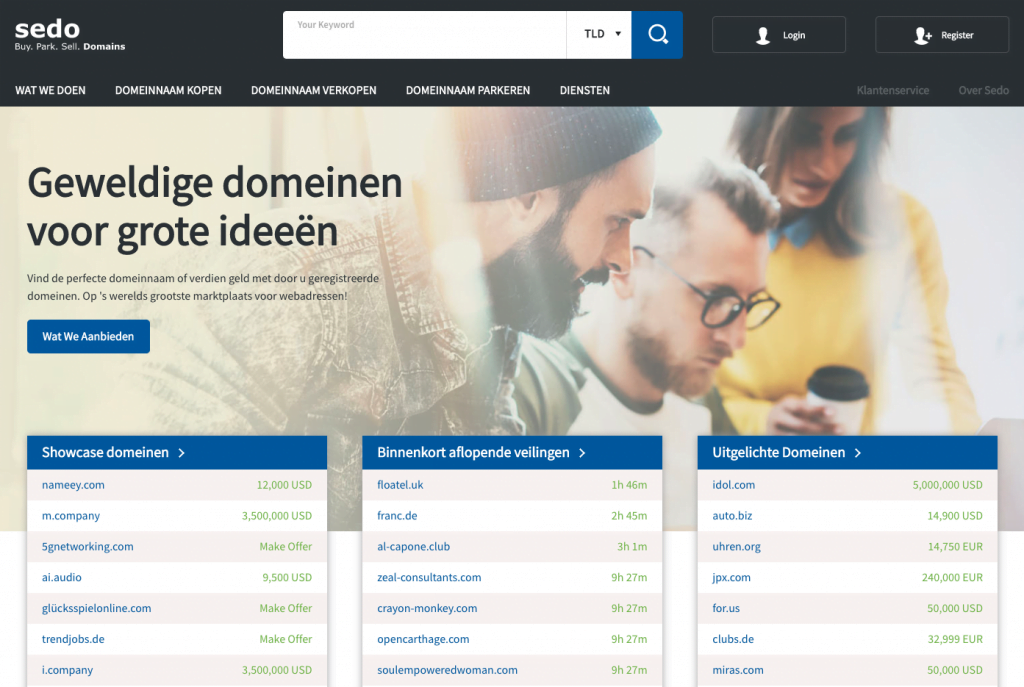How to Choose and Purchase a Domain Name in 2025
You need a domain name. Want to know right away where to get a good one at a great price? Go with Hostinger. They're reliable and affordable.
You need a domain name, but you don't know where to start.
It's a long-term choice; you'll see and use your domain name frequently.
It's therefore extremely important that you choose the right domain name through the right provider.
But how do you choose a good domain name? What do you do, for example, when your favorite domain name is already taken? And how do you make sure you choose a good one?
In this guide, I'll share all the steps I follow when purchasing a domain name. I've put these steps together after learning the hard way through trial and error. This manual ensures you won't make the same mistakes I did when registering a domain name.
I'll also discuss the best companies for purchasing a domain name and share some clever tactics for negotiating when your desired domain name is already taken.
Why Would You Want a Domain Name and How Does It Work?
The internet works via IP addresses. Every computer (including every website) has its own unique IP address through which it can be found.
That looks something like this: 66.249.73.12
An IP address is somewhat like a digital version of a street address or postal code.
You can imagine that you wouldn't want to force people to memorize this code. Just like you wouldn't try to learn a phone number by heart.
When you purchase a domain name, you're essentially buying an understandable, easy-to-find label that you attach to your IP address. This makes your website easy to locate—not just for visitors, but also for search engines like Google and Bing.
You always need to register a domain name. This works on a subscription basis. There are a few organizations that ensure no duplicate domain names exist.
That would certainly be confusing. Read more here about domains and how they work.
Furthermore, a domain name must always consist of numbers and/or characters (for example, “start24”) and must always end with an extension (for example, “.nl” or “.com”).
How to Choose a Domain Name
When registering a domain name, you should choose a good name that fits well with the purpose of your website. Sometimes you'll use a website and its associated domain name as a digital business card for an existing company or organization.
In other cases, your brand or name may exist only online, so you'll also need to consider your online discoverability on platforms like Google.
Choosing a domain name depends on your concept and availability. Many obvious domain names will already be taken. The following step-by-step guide will help you select a domain name.
Step 1 – Brainstorming
Before purchasing a domain name, you should first be clear about which name you want. The best way to figure this out is to write down many different variations on a long list.
Through my company Devise (a data analysis firm I founded a few years back), we purchased multiple domain names without much consideration. We eventually discarded most of them because, in hindsight, they weren't logical choices at all. This was something we could have avoided.
You probably already have a few ideas – write those down first on your list of ideas.
Then write down all variations of these names.
Example: Looking for a domain name for your soccer club “fc Knudde”? You might try options like “knudde.nl”, “fcknudde.nl”, “knuddefc.nl”, “vvknudde.nl”, or “knuddesport.nl”, etc.
At some point, you'll run out of ideas and variations. Get even more inspiration through the mind map view on synoniemen.net or by using Shopify's business name generator.
You can get creative with the combinations of your domain name and extension. Many startups use “.io”, for example.
Many international companies are currently choosing Libya's domain extension (“.ly”). For example, the company Calendly has the short domain name “calend.ly”. However, do consider whether this fits with your website's purpose.
You determine how long your list should be yourself. I usually keep mine to about 50 items.
Step 2 – create a shortlist of the best domain names
Now it's time to trim down that extensive list from step 1 into a shorter list and check whether your chosen names are actually available.
There are several standard principles regarding domains:
- The shorter, the better.
- Initially, stick with the extension that's right for your target audience (such as “.nl” or “.com”). Don't register every possible extension you can think of.
- Choose an “evergreen” name. Avoid using names related to trends or current news events.
- Use relevant search terms in your domain name whenever possible.
- Don't use hyphens in your domain name.
If you're planning to open a bike shop, it's better to choose a name that includes the word “bikes” rather than “two-wheelers” when you consider search volume. The difference is enormous. See the images below.

Ask yourself a few more questions about each of the options that remain on your shortlist:
- What happens when you type a domain name as a search query in Google?
- Is the domain name (or part of the domain name) registered as a trademark? Using something like “cheapapplephones.nl” could get you sued. Check here whether a brand name is registered as a trademark.
- Is the name easy to spell?
- Does the name or combination of words mean something different in another language?
- Are there other sites with domain names that closely resemble this one?
- Can you pronounce the domain name properly?
- Does your target audience understand the name (what you think isn't actually important)?
- Try the “dummy test.” Ask someone who has absolutely no knowledge about domain names, branding, or related topics.
Step 3 – Choose the best domain name and check availability
Type the names from your shortlist into your browser one by one to see which page comes up.
Option 1: Do you see an existing website? Then this domain name will be difficult to obtain initially. You can remove these options from your list for now.
Option 2: Do you see a page without relevant text but with advertisements? Then the domain name is probably parked.
Domain parking refers to when someone has registered a domain name but hasn't connected it to a website. These domain names are often for sale. You can acquire the domain by paying a one-time fee. Keep this name on your shortlist for future consideration.
Option 3: You see nothing or a page indicating the domain is available. This gives you the best chance to register the domain. Make a note next to the name in your list that this domain name is available.
How did we choose our domain?
You'll find that your favorite domain names from your list are probably already taken.
We were very fortunate with the availability of “start24.nl.” It's a short, clear domain name that's easy to type. WebsiteGecko had been taken for years just before we began this project.
Typically, you'll find that such short domain names are no longer available for purchase.
With Devise, things didn't go as smoothly: “devise.nl” was already taken, so we initially chose “meetdevise.nl” – as in “meet Devise.” Unfortunately, some people misinterpreted this as “measurement division” – like a division that measures things.
When we realized this, we purchased “deviseanalytics.nl.” No one could spell this name correctly, and having to spell it out loud over the phone was absolute hell.
Everyone consistently misspells “Devise” with a “c”.
As a final mistake, we registered the domain for as many as 8 different countries.
I made a series of basic mistakes that we could have avoided if we had followed this guide.
How do you choose a domain name provider?
You've now selected a domain name and confirmed it's still available. How do you register this domain name and what should you pay attention to? You do this through a domain registrar.
A domain registrar is the company through which you register your domain name in the global registry (ICANN).
This ensures that everyone knows you have the right to link that name to an IP address.
There are thousands of companies that can do this for you. The price for registering a domain name varies widely from less than a euro per year to approximately €100 per year, depending on the extension and the provider.
Key Considerations When Choosing a Domain Name
The domain price. You'll find real bargain hunters and slightly more expensive providers.
Contract term. You can often secure a domain for a longer period. This usually gives you a discount. Already know you'll be keeping the domain for a while? Register the domain name immediately for a longer period.
Potential discounts. Many domain name providers offer huge discounts for the first year. This is deceptive. After a year, you suddenly end up paying double or triple the price. Pay close attention to this.
Customer service. Connecting your domain isn't difficult, but it's certainly nice to have access to good customer service with comprehensive documentation. You're obviously paying for this level of support, which is why prices tend to be higher in these cases.
Additional services. Few providers only offer domain names. Most will offer hosting and a domain name as a plan deal. This can provide you with extra benefits, and everything is managed by a single company.
Automatic data protection. Are you a domain owner? Then your information may be published publicly. This can even go as far as displaying your address and phone number.
You can choose to have this information protected (or have someone do it for you). Most providers do this automatically, but others charge an extra fee for this service. Keep this in mind.
These are the best providers for registering your domain name with hosting
In many cases, you'll want to purchase your first domain name together with hosting. Hostinger and Cloud86 both provide hosting services and can also register your domain name for you.
Hostinger

Hostinger is an excellent place to register a domain name. They offer domain names at incredibly low prices, starting from just €0.89. .NL domains begin at €4.99.
When you purchase a web hosting plan for at least 1 year, you'll get a free “.com” domain for the first year. In many cases, your domain name is included at no extra cost. Just be mindful of any discounts that may expire after the first year. Read the full review here.

Cloud86

Cloud86 is a relatively new Dutch hosting provider. While they're known for their WordPress hosting, they also offer an easy way to register a domain name.
You can register a .nl domain name with Cloud86 starting from €11.95 per year.

I recommend getting your hosting and domain name from the same provider. It saves you extra hassle and unnecessary connection setup work.
Want to set up domain names and hosting separately?
I recommend keeping your hosting and domain name with the same provider. This saves you extra hassle and unnecessary connection steps.
Are you planning to purchase multiple domain names in the future? If so, it might be worth keeping them with a different provider than your hosting. In this case, take a look at Cloudflare, a reliable company where you can register domain names at competitive prices.
Domain names and hosting are two closely related topics, but they're not exactly the same thing.
What should you do when your favorite domain name is already taken?
It may happen that your favorite domain name is no longer available for registration. This means someone else has already registered the domain name.
In many cases, you can purchase this registration from someone else. Keep in mind that this might involve significant amounts of money.
I purchased (the registration of) “Devise.nl” for around €4,000. Mark Zuckerberg paid approximately $200,000 for “facebook.com”.
Companies that trade in domain names to make money are called domain traders. They register thousands of domain names for just a few euros per year and then try to sell them for much higher prices.
There are a number of specialized websites for buying and selling domain names (and their registrations). These sites function as a type of broker.
Buying and Selling a Domain
The German Sedo is a well-known and reliable service that I've used multiple times to buy and sell domains.
Similar to a broker, they receive a commission per transaction. You can also give the Sedo team specific search requests or have them purchase a domain for you.
If you're just starting a business, in most cases you probably won't want to immediately purchase an already registered domain name due to the high investment required.
In such a case, it's smart to get started with the best available option for a while.
Once you've reached the point where you can afford to invest in your perfect domain name, that's when you make your move. For Devise, this moment came after about 3 years.
The advantage is that domain names tend to maintain their value quite well, and there's a good chance you can sell them for roughly the same amount or even more. So you're not throwing your money away.
How do you determine if your domain name is worth the investment?
The value of a domain name is somewhat subjective.
How well you can calculate this depends on the purpose of your website. Do you have an online store or an SEO project focused on a specific keyword?
You can quite effectively calculate different scenarios to estimate how much additional revenue you can expect from improved rankings due to the domain name.
Although it's not a crucial ranking factor in SEO, it builds more trust and can help you get more clicks on your domain name.
When it comes to branding, as in my case with the purchase of “Devise.nl,” the calculation isn't quite as straightforward.
We decided it was worth the investment. Not only did our domain name become more powerful, but our brand and email addresses as well.
Our email addresses changed from “@deviseanalytics.com” to “@devise.nl”, which was a significant improvement.
Please note that after purchasing a domain name (registration), you'll need to place it with a domain registrar.


